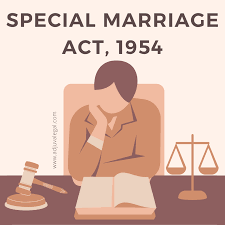Ahmedabad
(Head Office)Address : 506, 3rd EYE THREE (III), Opp. Induben Khakhrawala, Girish Cold Drink Cross Road, CG Road, Navrangpura, Ahmedabad, 380009.
Mobile : 8469231587 / 9586028957
Telephone : 079-40098991
E-mail: dics.upsc@gmail.com

Special Marriage Act, 1954
News: The Act was in news recently after a celebrity registered her marriage under the provisions of this act.
What is SMA, 1954?
It governs a civil marriage where the state sanctions the marriage rather than the religion.
The SMA allows marriage between inter-faith or inter-caste couples without giving up religious identity or opting for conversio
Whereas, personal laws such as the Muslim Marriage Act, 1954, and the Hindu Marriage Act, 1955, require either spouse to convert to the religion of the other before marriage.
Who can get married under the SMA?
The applicability of the Act extends to the people of all faiths, including Hindus, Muslims, Sikhs, Christians, Sikhs, Jains, and Buddhists, across India.
Some customary restrictions such as parties not being within degrees of a prohibited relationship still apply to couples under SMA.
Further, Section 4 of the SMA requires that both the parties should be capable of giving consent and must be of sound mind.
The minimum age to get married under the SMA is 21 years for males and 18 years for females.
Section 19 of the Act provides that couples belonging to the undivided Hindu, Buddhist, Sikh or Jain religion shall be deemed to end their relationships with their family that might affect their inheritance rights.
What is procedure for a civil marriage?
Under Section 5 of the Act, the parties to the marriage are required to give a notice, in writing, to a “Marriage Officer” of the district in which at least one of the parties has resided for at least 30 days immediately preceding the notice.
Under Section 6 of the Act, a copy of the notice is kept under the “Marriage Notice Book” which is opened for inspection at reasonable times.
After receiving the notice, the marriage officer publishes it to invite any objections to the marriage within 30 days.
What is Section 7 of the act that deals with ‘objection to marriage’?
It allows any person, within 30 days of publishing the notice, to object to the marriage on the ground of violation one or more of the conditions specified in Section 4 of the Act.
If an objection has been made, the Marriage Officer looks into the matter and marriage is not solemnized until the officer is satisfied against the objection or unless the person making such an objection withdraws it.
However, this provision is often criticized because it is misused to harass couples.
Moreover, the Delhi High Court in 2009 struck down the practice of posting the notice of intended marriage under the SMA because it violated the right to privacy.
The Allahabad High Court in 2021, ruled that couples seeking to solemnize their marriage under the SMA can choose not to publish the mandatory 30-day notice of their intention to marry.

Address : 506, 3rd EYE THREE (III), Opp. Induben Khakhrawala, Girish Cold Drink Cross Road, CG Road, Navrangpura, Ahmedabad, 380009.
Mobile : 8469231587 / 9586028957
Telephone : 079-40098991
E-mail: dics.upsc@gmail.com
Address: A-306, The Landmark, Urjanagar-1, Opp. Spicy Street, Kudasan – Por Road, Kudasan, Gandhinagar – 382421
Mobile : 9723832444 / 9723932444
E-mail: dics.gnagar@gmail.com
Address: 2nd Floor, 9 Shivali Society, L&T Circle, opp. Ratri Bazar, Karelibaugh, Vadodara, 390018
Mobile : 9725692037 / 9725692054
E-mail: dics.vadodara@gmail.com
Address: 403, Raj Victoria, Opp. Pal Walkway, Near Galaxy Circle, Pal, Surat-394510
Mobile : 8401031583 / 8401031587
E-mail: dics.surat@gmail.com
Address: 303,305 K 158 Complex Above Magson, Sindhubhavan Road Ahmedabad-380059
Mobile : 9974751177 / 8469231587
E-mail: dicssbr@gmail.com
Address: 57/17, 2nd Floor, Old Rajinder Nagar Market, Bada Bazaar Marg, Delhi-60
Mobile : 9104830862 / 9104830865
E-mail: dics.newdelhi@gmail.com